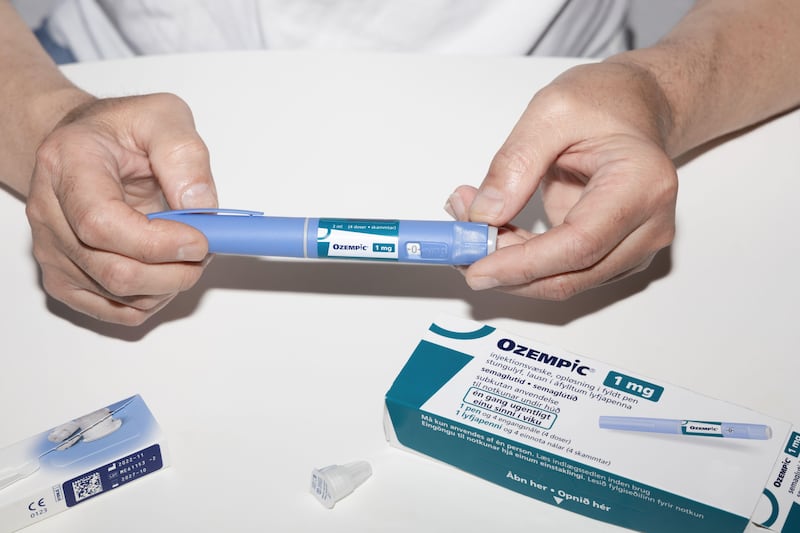Pharmacy leaders have urged people not to buy fake weight-loss jabs online as they said shortages of Ozempic are expected to stretch into next year.
The National Pharmacy Association (NPA) warned of a possible “explosion in the unlicensed sale of medication online”, with people risking their health by purchasing Ozempic and Wegovy (semaglutide) without proper checks.
The weight-loss injections have become very popular, with social media showing before and after pictures of fat loss, and some celebrities endorsing their use.
Ozempic is available on the NHS for people with type 2 diabetes, while Wegovy can be prescribed for weight loss via specialist weight management services, with strict criteria around who can get the drugs.
Pharmacists are experiencing a shortage of Ozempic, fuelled by high demand plus the fact some medics are prescribing it off-label for obese people.
Ozempic, made by Novo Nordisk, helps people with type 2 diabetes regulate their blood sugar levels but its ability to suppress appetite has also led to people using it to lose weight.
This has led to a shortage of the drug for those with diabetes while also fuelling a rise in counterfeit jabs.
The NPA, which represents more than 5,000 independently-run community pharmacies, is urging patients to speak to their pharmacist or GP instead of buying medicines online from sellers who are not registered and regulated in the UK.
It also warned that problems obtaining Ozempic are likely to continue into next year.
Nick Kaye, chairman of the NPA, told the PA news agency: “Pharmacists remain deeply concerned that the current medicine shortages crisis could lead to an explosion in the unlicensed sale of medication online.
“Stocks of Ozempic are very depleted in community pharmacy in the UK and it is important that these remain prioritised for those in the most clinical need.
“Given the precarious state of supply of this and other vital medication, there is a much greater risk of people looking to order in supplies from disreputable online vendors.
“Wegovy stocks aren’t too bad at the moment, it’s Ozempic that is problematic.
“We’ve been told those stocks aren’t going to come back in in 0.25(mg), 0.5mg or 1mg doses until December 27.
“That’s the current projected date from the manufacturers themselves.
“In all of our experience, it’s much less likely to be earlier than that date and much more likely to be later.”
People often start Ozempic on the lowest dose of 0.25mg before moving up through the levels if needed.
In January, the Department of Health and Social Care told healthcare providers not to prescribe the drugs off-label for weight loss, and said existing stock must be reserved for patients with type 2 diabetes.
It said “supply issues have been caused by an increase in demand for these products for licensed and off-label indications” and supply is “not expected to return to normal until at least the end of 2024”.
Mr Kaye said “We don’t know how prevalent off-label prescribing is but we do know (it happens).
“And we really worry about the fakes within the supply chain.
“People want to access these drugs and when they can’t because they’re out of stock, they can end up going elsewhere.
“In the UK, we do have regulated and safe online supply in places.
“We’re not saying all online (sales) should be banned but we want to make sure it’s the right type of organisation and accredited.”
Mr Kaye said people can do checks to see if an online provider is registered and regulated by the General Pharmaceutical Council or Pharmaceutical Society of Northern Ireland
The NPA also wants to see a reintroduction of rules that make it mandatory for a list of regulated online UK medicine sellers to be publicly available.
It said such rules were scrapped in the UK following Brexit.
Mr Kaye said: “We think this step will help to improve patient safety.
“Medicines are not like ordinary goods for sale online, they must be handled with great care because they have the power to harm as well as to heal.
“We urge anyone who is unsure about medicine they purchased online to speak to their local pharmacist for advice.”
In June, the World Health Organisation issued a medical product alert over fake semaglutide stocks detected in Brazil, the UK and the US.
It said there have been increasing reports of false semaglutide since 2022.
Meanwhile, in the US, the Food and Drug Administration has warned against people overdosing on the drugs, with reports of some people suffering severe nausea, vomiting, headache, dehydration, pancreatitis and gallstones.
A Department of Health and Social Care spokesman said: “We strongly advise the public not to buy regulated medicines from unauthorised online retailers or beauty salons as they could be dangerous.
“The Medicines and Healthcare products Regulatory Agency continuously works to identify those unlawfully trading in medicines and will use its powers to take appropriate enforcement action, including, where necessary, prosecuting those who put people’s health at risk.
“Separately, we are taking action to tackle the obesity crisis head on – shifting our focus from treatment to prevention – which will ease the strain on the NHS and helping people to live well for longer.”









